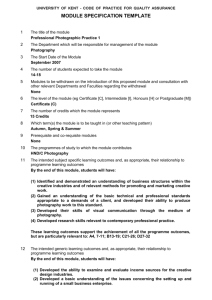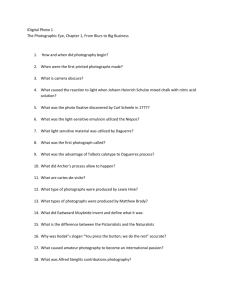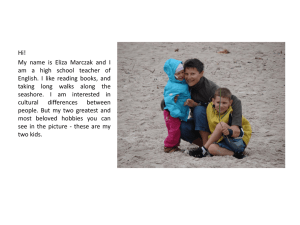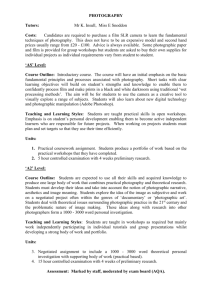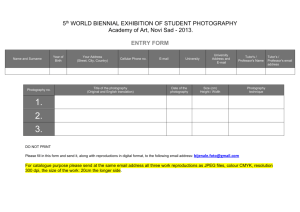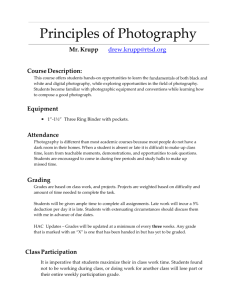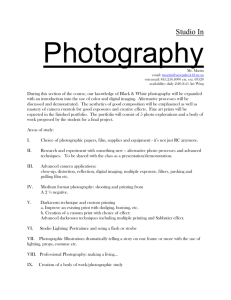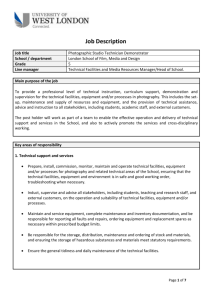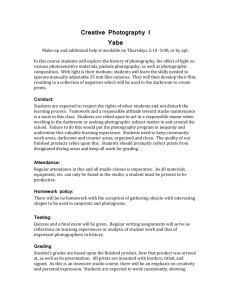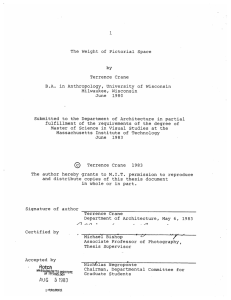HA327 - University of Kent
advertisement
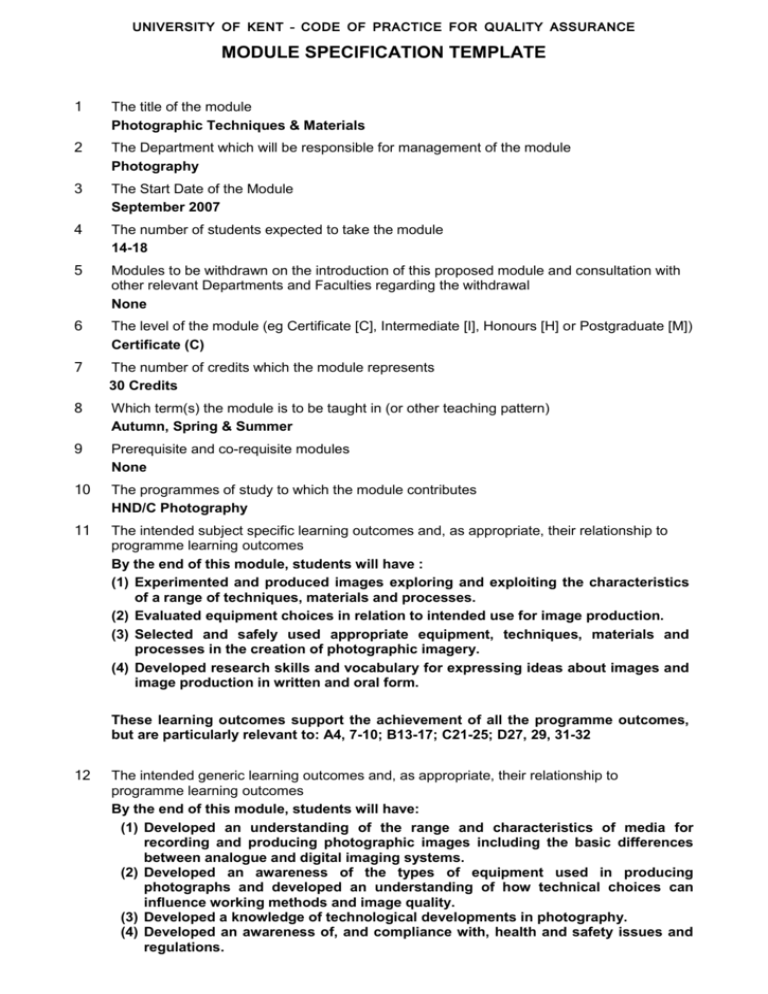
UNIVERSITY OF KENT – CODE OF PRACTICE FOR QUALITY ASSURANCE MODULE SPECIFICATION TEMPLATE 1 2 3 4 5 6 7 8 9 10 11 The title of the module Photographic Techniques & Materials The Department which will be responsible for management of the module Photography The Start Date of the Module September 2007 The number of students expected to take the module 14-18 Modules to be withdrawn on the introduction of this proposed module and consultation with other relevant Departments and Faculties regarding the withdrawal None The level of the module (eg Certificate [C], Intermediate [I], Honours [H] or Postgraduate [M]) Certificate (C) The number of credits which the module represents 30 Credits Which term(s) the module is to be taught in (or other teaching pattern) Autumn, Spring & Summer Prerequisite and co-requisite modules None The programmes of study to which the module contributes HND/C Photography The intended subject specific learning outcomes and, as appropriate, their relationship to programme learning outcomes By the end of this module, students will have : (1) Experimented and produced images exploring and exploiting the characteristics of a range of techniques, materials and processes. (2) Evaluated equipment choices in relation to intended use for image production. (3) Selected and safely used appropriate equipment, techniques, materials and processes in the creation of photographic imagery. (4) Developed research skills and vocabulary for expressing ideas about images and image production in written and oral form. These learning outcomes support the achievement of all the programme outcomes, but are particularly relevant to: A4, 7-10; B13-17; C21-25; D27, 29, 31-32 12 The intended generic learning outcomes and, as appropriate, their relationship to programme learning outcomes By the end of this module, students will have: (1) Developed an understanding of the range and characteristics of media for recording and producing photographic images including the basic differences between analogue and digital imaging systems. (2) Developed an awareness of the types of equipment used in producing photographs and developed an understanding of how technical choices can influence working methods and image quality. (3) Developed a knowledge of technological developments in photography. (4) Developed an awareness of, and compliance with, health and safety issues and regulations. UNIVERSITY OF KENT – CODE OF PRACTICE FOR QUALITY ASSURANCE (5) Developed techniques in research and presentation related to the themes of the module. These learning outcomes support the achievement of all the programme outcomes, but are particularly relevant to: A4, 6-10; B13-17; C21-25; D27, 29, 31-32 13 14 A synopsis of the curriculum This module provides an introduction for students to the range of techniques, materials and processes currently available to the photographer. This knowledge and understanding is essential for underpinning practical work on other modules of the programme. It is intended to link closely with the Visual Design and Concepts in Photography modules. This module will enable students to develop the technical skills needed to manage their projects in a chosen areas of photographic practice and make informed decisions about the use of techniques and technology. Indicative Reading List Reading appropriate to individual students’ personal and project needs will be recommended by tutors in the course of discussion and tutorials. Jacobson, et al, (2000), The Manual of Photography, 9th ed, Focal Press Davies, et al, (2001), Digital Imaging for Photographers, 4th ed, Focal Press Langford, M, (1998), Advanced Photography, 6th ed, Focal Press Langford, M, (2000), Basic Photography, 7th ed, Focal Press Stroebel, L, (2000), Basic Photographic Materials & Processes, Focal Press London, et al, (2004), Photography, 8th ed, Prentice Hall 15 Learning and Teaching Methods, including the nature and number of contact hours and the total study hours which will be expected of students, and how these relate to achievement of the intended learning outcomes The total learning time for the module is approximately 400 hours. Learners will be expected to undertake independent study and project work, including the preparation of workbooks from individual research. There will be lectures and demonstrations on a variety of techniques, materials and processes and on the required research. There will be workshops to actuate technical and creative skills and in respect of presenting work. Specialist tutorials will support the student’s individual needs in producing project and research work. 16 Assessment methods and how these relate to testing achievement of the intended learning outcomes This module will be assessed by: 60% project work 40% Workbook, research and presentation Projects will be assessed on the development of ideas and the use of appropriate techniques and on the technical quality of the work and its final presentation. These assessment methods support the achievement of all of the learning outcomes, but are particularly relevant in respect of: A4-10; B13-17; C21-25; D27, 29, 31-32 UNIVERSITY OF KENT – CODE OF PRACTICE FOR QUALITY ASSURANCE 17 Implications for learning resources, including staff, library, IT and space Access to specialist photography resources and equipment. Suitable specialist support from staff. 18 A statement confirming that, as far as can be reasonably anticipated, the curriculum, learning and teaching methods and forms of assessment do not present any non-justifiable disadvantage to students with disabilities As far as can be reasonably anticipated, the curriculum, learning and teaching methods and forms of assessment for this module do not present any non-justifiable disadvantage to students with disabilities. Statement by the Director of Learning and Teaching: "I confirm I have been consulted on the above module proposal and have given advice on the correct procedures and required content of module proposals" ................................................................ Director of Learning and Teaching .............................................. Date Statement by the Head of Department: "I confirm that the Department has approved the introduction of the module and, where the module is proposed by Departmental staff, will be responsible for it’s resourcing" ................................................................. Head of Department .............................................. Date (Where the module is proposed by an Associate College) Statement by the Nominated Officer of the College: "I confirm that the College has approved the introduction of the module and will be responsible for it’s resourcing" ................................................................. Associate College .............................................. Date
